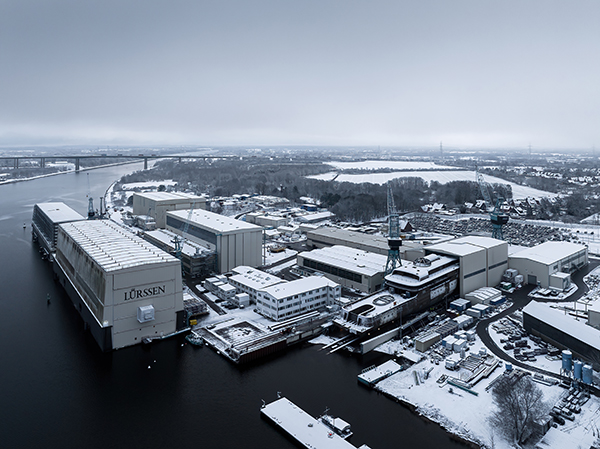Instability breeds uncertainty for markets

Lurssen shipyard launches its Project Cosmos in Germany.
Financial markets might be looking forward to a Santa rally but global instability continues to cast an air of caution over the superyacht industry.
War in Ukraine, conflict in the Middle East and talk of recession present ongoing concerns for the yacht market following recent “exuberance”.
“The yachting business is very small, so it doesn’t take much of an uptick or a downtick to affect the mood,” says Michael Breman, sales director, Lürssen.
“Markets today are uncertain because there are two wars going on. This is not a positive time for the world. When there is uncertainty and stress some people thrive but in general, if the consensus is not well, people get a little bit cautious.
“There is the sentiment that a financial crisis is in the works, and is inevitable for some, and the wealthy are positioning themselves to weather that storm.
“A lot of people have come back down to earth after the exuberance after Corona.”
What the industry really thinks about sustainability

Lürssen’s shipyard in Germany. Photo: Tom van Oossanen
Pipeline concerns
Speaking from his office in Germany, Breman said Lürssen was “busy” with “lots of projects under way”, the “result of hard work in the past, and hopefully the hard work we’re doing now will pay off in orders in the next six to 12 months”. Although he refused to reveal the exact number of boats under construction, he added that the next available delivery date for a new build is “somewhere in 2028”.
Shipyard order books are a “good litmus test” of market conditions and suggest the general appetite for yachting is “still very strong”, particularly at the top end where high interest rates are less of a factor, according to Henry Craven-Smith, senior partner, Burgess.
However, there are concerns about the pipeline and what happens with the shipyards after 2027 or 2028, says Derek Munro, director of yacht management company Divergent Yachting.
“Normally by now they would be discussing the next slots and I think those slots are not filling as fast as they used to, hence they’re all diversifying into refit,” says Munro, who has been involved in 14 new builds – notably Black Pearl – in his 35-year career in yachting.
“A lot of new-build yards have refit divisions which they wouldn’t have promoted four or five years ago.”

“Kids aren’t coming through wanting to be carpenters, painters, electricians, plumbers in shipyards – there’s a shortage all across the board.
New-build prices have also soared – up by 25-40% in some cases – fuelled by the instability of war, inflation and supply chain issues, but dwindling manpower in the shipyards is contributing to delays in delivery.
“I’ve visited four shipyards in the last two weeks and they’re all talking about the need for more people,” says Munro.
“Kids aren’t coming through wanting to be carpenters, painters, electricians, plumbers in shipyards – there’s a shortage all across the board.
“Four years ago if you wanted to build a 70m yacht it would have taken two-and-a-half to three years but now shipyards are saying three-and-a-half to four years, because of the delay.”
There is an argument to say that higher costs and delays are putting people off building new yachts in favour of used boats – or even buying alternative assets such as jets or houses – but Breman believes the mindset of someone wanting their own creation overrides that.
“For somebody who has the will to build a boat, certainly a larger boat which is where we come in to play, the alternative of a brokerage boat is less on the cards,” he says.
“But certainly, fear of inflation is seeping into the wages, forcing suppliers to increase prices that result in what are perceived as higher costs. We have to be careful with what we give away in terms of prices because it can scare many people off that things are too expensive.”

The sailing yacht Black Pearl was one of Munro’s projects as owner’s representative. Photo: Shutterstock
“The US market is very, very active and has been the last few years.
While “buyers are still buying”, there are clear signs that the market is “more risk averse” given the global headwinds, according to Craven-Smith.
“I don’t think it’s deterred people but there are a lot of ex-Russian assets being seized and that’s going to be interesting to see how that plays out,” he says. “People are concerned, and there is definitely an increased awareness over the provenance of these yachts.”
But barring any other unpredictable “black swan” events, Craven-Smith thinks the market “is in a stable place at the moment”.
“We’re fortunate in that the number of products we have available is still limited in supply relative to the amount of people who can afford to go yachting so that has allowed prices to remain steady,” he says.
“The US market is very, very active and has been the last few years. That was always the biggest market for us and remains so, and we’re selling big boats to first-time yachts owners in the US. That has taken up a lot of slack elsewhere in the market.
Subscribe to our free newsletter
For more opinions from Superyacht Investor, subscribe to our email newsletter.

